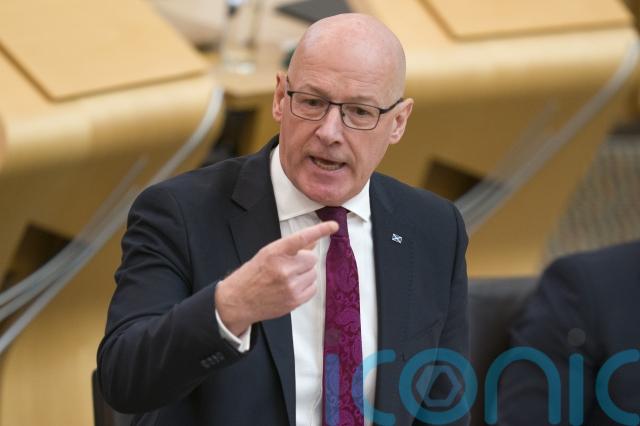
The Scottish Government should put conditions on companies receiving public money to help deliver a just transition, a report has said.
The Just Transition Commission said conditions on Government funds, licensing and procurement could be a key lever to delivering net zero in a way that is fair to workers.
A just transition aims to ensure that those in the oil and gas sector are not left behind by the transition towards renewable energy.
The commission, an expert body appointed by the Scottish Government, said ministers could place conditions on money and support to companies to improve workers’ conditions.
According to the report, that could mean strengthening commitments on collective bargaining agreements and permanent contracts, as well as provisions to help workers plan for major changes, including closures.
Other measures include supporting the development of domestic supply chains for sustainable industries such as manufacturing for wind power and encouraging apprenticeship schemes.
The Scottish Government requested advice from the Just Transition Commission to support its just transition plan for Grangemouth in June this year.
The plan included efforts to develop a series of conditions for firms to receive funding that would help deliver a just transition and “maximise the reach of public funding, particularly for workers and the wider community”.
The Scottish Government committed £25 million to Grangemouth while the UK Government announced £200 million for the area from the National Wealth Fund, following the decision from its owners to close the refinery and cut 400 jobs.
The report comes a week ahead of a summit in Edinburgh which will see political and industry leaders try to reach a consensus on how to reach net zero.
First Minister John Swinney and UK energy minister Michael Shanks will be among those to deliver keynote speeches at the event hosted by Dynamic Earth.
All MSPs have been invited to the summit along with representatives of all 32 local authorities, every chamber of commerce and every Scottish college.

Riyoko Shibe, a University of Glasgow researcher and the report’s author, said: “Grangemouth is on the cusp of energy transition with the promise of substantial investment packages from the Scottish and UK governments into a green industrial future.
“Just transition conditionalities are a way for this investment to be deployed with impact and integrity, and maximise its public return.
“The evidence presented in this report shows just transition conditionalities are an exciting opportunity for the Scottish Government to join other countries taking bold and innovative action to deliver a just transition.”
Professor Dave Reay, co-chair of the commission, said: “Our new research will be really helpful to policymakers in making just transition a tangible reality for businesses, workers and communities.
“It greatly improves our understanding of how conditionalities can be deployed strategically in line with just transition objectives, including encouraging the growth of domestic supply chains for sustainable industries and greater security for workers.”
Satwat Rehman, fellow co-chair of the commission, said: “Today’s research report will help inform the work under way to support people at Grangemouth and shape the renewal of the industrial site for the better.
“But it also has great potential to enhance the effectiveness of public policy for other critical areas for a just transition, including future ScotWind leasing rounds, economic development initiatives such as green freeports and investment zones, the future agricultural support model and public procurement for transport infrastructure.”
Climate Action Secretary Gillian Martin said: “The Scottish Government welcomes this independent report from the Just Transition Commission ahead of their summit next week.
“This work reflects the productive, working relationship we have fostered with the commission to support our mission to delivering a just transition to net zero.
“We will actively consider how the findings of the report can build upon our existing practice.
“We already apply conditionality to support we provide and, since 2023, have applied Fair Work conditionality to our grants, requiring payment of at least the real living wage and provision of appropriate channels for effective workers’ voice.”
She added: “It is estimated that over £6 billion worth of public sector grants has been awarded with Fair Work First criteria attached between July 1 2023 and March 31 2025.
“As outlined in our Grangemouth just transition plan, we are actively considering how to apply conditionality to support the Grangemouth workforce and we welcome the commission’s research in informing our efforts to do so.”
Subscribe or register today to discover more from DonegalLive.ie
Buy the e-paper of the Donegal Democrat, Donegal People's Press, Donegal Post and Inish Times here for instant access to Donegal's premier news titles.
Keep up with the latest news from Donegal with our daily newsletter featuring the most important stories of the day delivered to your inbox every evening at 5pm.